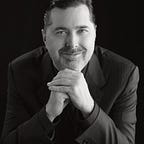Problematic Memes: the Handmaid’s Tale Redux
When social media platforms manipulate our memes, they achieve effects opposite of our intentions
In case you missed it, the Supreme Court struck a nasty blow or two against the ‘separation of church and state’ in 2022.
Lots of eyes on Dobbs v. Jackson Women’s Health, which overturned Roe v. Wade. Fewer eyes on Kennedy v. Bremerton, which held that if a coach wanted to conduct public prayers at the 50-yard line, the school could not stop him from doing so.
In the face of anguish and fear, people concoct memes like the following and add them into “their personal” streams and feeds:
Interesting meme. The author even included the word, “respectfully” before debunking the introductory sentence. Curious why it keeps popping up?
Hmmm…let’s step back and think that over: who actually owns “our social media streams”? We didn’t pay to use these services: we use them based on a “free license” issued by the platforms, subject to their own limitations. Corporations own “our streams” — not us. Corporations sell access to our streams to people who are willing to pay because they think they can influence us.
Can they? Well…yes.
“Kristin O’Connell” (whoever s/he is) will receive nary a penny for her thoughts. But those thoughts will not be distributed for ‘free’ — someone wants others to see these particular thoughts and is willing to pay real world money to make that happen. Who? Why?
Imagine there’s a tight Senate race in which a religious DEMOCRAT is running for office, sort of like REVEREND Raphael Warnock.
There are a lot of ways to win an election. The easiest/cheapest involves getting a very large niche of people who support your rival to sit down, shut up, stay home — and look with suspicion at all those lying politicians.
How to do that? If Republicans tried to run ads on television, younger voters, atheists, and those who generally dislike religion wouldn’t even see them — so why bother? But if they could amplify a message that reinforced hostility toward religion — again and again and again — and then remind those ‘infrequent’ voters about REVEREND Raphael Warnock’s religious background, they could discourage those voters without needing to spend anything approaching what they must spend to air ads on television.
Young voters who love “The Handmaid’s Tale” aren’t going to vote for the GOP candidate. But will they bother to fill out a ballot and vote for something when “REVEREND” Raphael Warnock is at the top of the ticket? Will they wait in line for some religious person they’ve never heard of except for an ad here or there? Why trust that guy? He’s religious! Religion controls too much of the country already…
Anyone who actually reads and thinks deeply about politics will not be influenced by such gambits.
Anyone who actually ignores politics and simply does what their ‘tribe’ does every year without fail will also not be influenced by such gambits.
But 5% of the voters? 10%? Enough to make a difference? And a large enough chunk that one can influence effectively at a cost that is just a fraction what it would take to do something comparable on television?
“Anti-religion” messaging is being amplified across social media for precisely this reason (and quite likely, religious cases were selected by the Supreme Court this term for this reason too…it’s no accident).
That’s probably not “Kristin O’Connell’s” intent — but Kristin doesn’t own her stream, other players do. They’ll use anything she or I or you say or think to influence whoever they wish however they can. They’re quite good at it. Those billionaires didn’t get there entirely by accident…
A better course of action? I wish more people read Kevin Kruse’s “One Nation Under God: How Corporate America Invented Christian America.”
Kruse’s basic premise is that America did NOT see a resurgence of religious fervor in the 1950s as a result of “anti-Communist” fear. Rather, corporations started investing in useful preachers and others in the 1930s and 1940s to try to create a dominant concept of Christianity in America that focused on individual salvation (and anti-Communism) rather than social good (which might be crypto-communism…).
Religion is nothing new, in America or anywhere else, nor is it always so threatening. Franklin Roosevelt deployed religious rhetoric routinely — even preached ‘sermons’ — to hold his New Deal coalition together. But Christianity as we have been told it is today is NOT the Christianity that FDR espoused.
Corporations sought to weed out the “love thy neighbor” Christianity typical of FDR’s era. They sought to paint federal taxes, government services, and almost all forms of regulation that could actually touch their bottom line as “communism.” In place of that, they launched a variety of “libertarian Christian” brands that all served to protect their interests from the only realistic threat to corporations in America: the government.
So let’s reconsider this part of O’Connell’s message:
“You’re allowed to let your religion control your own life. But you are not allowed to let it control the entire country.”
Cute: try to pit libertarianism against libertarianism. After setting up the implied “America doesn’t need Christianity” of an atheist or anti-Christian activist. O’Connell may have meant, “this country doesn’t need people who use the Bible to impose their will.” But O’Connell’s message will be interpreted as, “See how much they hate the Christians? They say they don’t need US! It’s either us or them!”
And that’s how we wind up with a Supreme Court that overturns Roe v. Wade and erases the separation of church and state. All based on the fact that a message that says one thing, amplified into a totally different form and re-deployed to a totally different group, will achieve the exact opposite thing.
